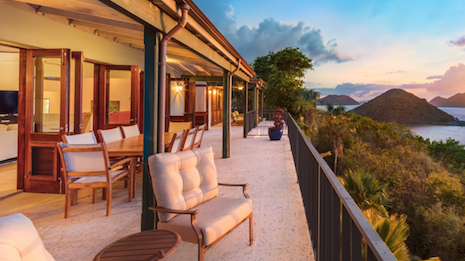Homebuyers who are purchasing second homes are increasingly looking at these investments in the hopes of earning rental income, as opposed to using the properties solely for leisurely retreats.
New research from real estate adviser Savills shows that two-thirds of owners rent out their second homes for at least part of the year in an effort to cover part, or all, of the expenses behind maintaining multiple properties. As today's technology simplifies the home rental process and expands the pool of potential renters, more than a third of all additional homes are bought as solely rental properties.
"Technology has revolutionized the global short-let market," said Paul Tostevin, associate director of world research at Savills, London. "Platforms such as HomeAway have expanded rapidly in the last decade, deepening and diversifying the demand base."
Second home priorities
Traditionally, second homes were purchased for the purpose of vacationing.
Less than two decades ago, only 14 percent of homebuyers purchased their additional properties for the purpose of earning rental income and not personal use.
"In 2000, around 80 percent of second homeowners never let their properties out commercially," Mr. Tostevin said. "Now over two-thirds prioritize income over personal use."

Urban properties attract a large number of renters. Image credit: Knight Frank
With the advent of online rental platforms, lower airfares and growing interest in more authentic travel experiences, these preferences have changed.
"Instant booking, mobile platforms, feedback and rating systems make these [home rental] services appealing to tech-savvy millennials, time-poor business travelers and globally mobile students and professionals," Mr. Tostevin said. "As a result, more are renting out their properties than ever before."

Luxify's app retails real estate and vehicles on mobile. Image credit: Luxify
Homeowners who are hoping their second properties will cover costs or even turn a profit from rent need to consider a variety of factors, such as amenities and location.
"Mexico and Costa Rica are less seasonal markets, so rental demand is spread throughout the year," Mr. Tostevin said. "European ‘summer sun’ destinations are highly seasonal, but this is offset somewhat by higher rents at peak season.
"City destinations — Rome, Barcelona, London, Los Angeles, New York, etc. — are also far less seasonal and benefit from deep rental pools — tourists, students, business travelers," he said.
Luxury home rentals
Digitally-oriented hospitality companies are making their presence known in luxury real estate markets.
Private travel club Inspirato is looking to make luxury vacation home ownership more accessible and streamlined for buyers through a new brand.
With the launch of Inspirato Real Estate, the luxury hospitality company will be able to add properties at a quicker pace, while providing real estate professionals with a curated list of pre-vetted properties. This new service comes on the heels of other disruptions in the luxury travel industry (see story).
Meanwhile, other vacation rental brands are pivoting in an effort to attract more affluent consumers.
Earlier this year, home-sharing service Airbnb introduced Beyond, a new luxury tier that offers custom-designed trips, including personalized experiences along with high-end rentals. Airbnb also assists luxury home renters with high-quality photograph and top placement on their travel app, to encourage views when customers search for luxury accommodations (see story).
Regardless of the platform, luxury homeowners looking to rent their vacation properties need to keep something in mind.
"Think like a renter, rather than an owner," Mr. Tostevin said.
{"ct":"GJm2YkiRzevjm3ZudnhlmabfaB+5PfNPPXZMKgpN9QX2FMVQQUeU\/jM4uembULaCDpeKEHu8WhI32KQ1FRsTgVrNP2zC9w39BR0neNPRU4D600zT7TE35WgqN3jb+JkHKL\/KqcnIPFwwlPbhy+jTF5nCu0d+K1u0RK5IK4ST80\/CGH8zVChcv5Qy6BPrjMKaQtgaAGSgQ30PvotXS+jgSYLBwXI8+WpPE32yEf8D5noKta\/LPtc48zgz92UUhcroLlFDoGrK8lW2JqdqklDw080A36MV4G9OACv7JPff6PYAWQDfXUpJf1Yzrf1LDVjWE5K136o\/ewC6CfqVq7hdEojp1McZ1KfwWnTRb3gOIBbYeJyn8LxgwhehG6q2nUeo91v\/P6IiC0b9O0Xwg0wlP3xW4v2\/pZr0AOnG31sHD9Xa3x1msZUss25aNDdgUCMN5ishN0poXlz1osquiiK81X0DadS3q+sk+Ka8jHZwPUc6+DUmve3NqwMnOzR2e7Pen0pPXsuxU8LOWJi7JpK7+3hMODDLfe8QKSDc2ACQR9lYp\/qWndrUHEvMRwFvCoO43v3IJ\/hvCUtu4njdv7MjwhNd9\/JFwqYpKLw8Zz6eES\/5VT+RC10eyoABkvH\/XQAjHVlJb5ZA2LL5Bee2ZwT8B8i13cpTKBhxW4L28xRreit2nDAy34Tx1bNng6qeXqehxIo1w5RZ\/HkbBkGTft5DMz2nHHQzmCB\/ISmQxtJOHLfcgfuUL3\/Fd5d4l+nlRqy9zfpH8g0sPdHnlFYvarsDg\/ZNwaAPLUmasoN5rHzvldEuhzol8255u\/9Ow7yjhRCcZoJgIdy00aV1vIXcwe2Air1Rglepa3vZMiqfi9hRsYJYINxb5CFmvXZnIMPHv60IoDGa1wEJUYn4Xd7M+EZIYnTWTXPfT28RjTKM7RgkEqCg7eXt4Vc4fFyIZFVcBO7vYo+NtO9PW2WV9KyKCD\/eZciDopJQToxIZuYCBJ+pOeHvL331sGvxUfr7EUHp9sPEWrUmRW3mf3s9Tj2ex6bJvfyNUlfezIXCGvhynnU7UkYMnfaIKpYcEgmM\/0HsMs2BGfDnrqF0UhcPmpKZr7MogRMCv+NaZOnrNq+D9ij\/+Q82zzUVPpJahWN4q7CgUZPY3p+ifbfiJItGMycr8ytdf8RM9dqaLMnkm3Uu+tYyPWYuOWs\/Poj7yCrSsdVDJedy+Upi\/G7jIk+7SyS38zqQMgg4NEmCjw9AKUdRcr5VLRPOCCfECwZjwqy226Sa8GKW3uxCirXnmn\/JVtmeMsB5H7fJtMAVkAKJmMRfASGcJvj1WsaNm88OJA5UXaLQrQnXl51tbzVvJ9GNfDQVsQHRuAhC3oQ8lukS9BGA4Dba1oQzUk0ZCWfEoSqECz+FSyGPEU55PZRjcVZM3KrqtEnr6dQUJQPLsfk752AjRAPeCuZn6Mx4wNkz2bARYuZSN2bq8uUcsvEf0Xj7wzuZZjhpJw65jkidnpUnSpX343QYi8GqotPb+6RX8NB7h5imxlxrDj5sStdwFCuBK7hL63sMNmgr786jew1IFH\/o781QtkRyrPbk8P9mYfx9osJ3OvaqAExW9\/lZwiEGszTupe1olziIRNfeYfVXsCB34B6TWF3ovbVKhufhxWd\/xBYdnsiKgHAuzRTYxGNjekAXyskuh\/6AJhUjhhT\/sgUxweazEb8pvxLkpmkOPGhDkslFKL+rCl37Hr7CIi42sBVIzUghOdqwm5Vqu5XEnoWLfrbgpv3exc4zpHk9BAVp+wun\/evUhCuNg+iAeeHEteY2jiQLBlendf2dGzZuWXk9n9m1AMfAQTKgYXHzjMVl4I0AlCahS1zdvBYyFxcqT85Y1SZ99pwkV28Py9L21a+srb8aWi5f01SDfs2142MklU3T20oSXW21GCr6KRATdCXvrObfCVbIRq0jsnCfAVIpMK79LHgno4qE8CHYdpcigvvav2gKNDpWUTr3Pzk2rsnM3B1y05NgsvN22qCup7M0s79XitOfP0Wn8i+1JNA4x1YteJ5rU7j5K45qXJ6nl9EvgPm2yZKm1GyRVZdtu66Hc4GRmd93TJ0Jd3YpzHj2\/E5zmEnmdU4agwCR\/mqr6Q\/dmnZxsJPr0xn1u3pmcg4pYJtHIDFnWfTr5rV1vlXRMrZjhQRpaTgoSLvC69cnwXh7ekIG5ov7aaR5Xig55CQAbNdsP94gM\/67DkzT9UNxJYlO+LAcvECy\/5h3VgstjRLQ7XPco7RrtNd\/siqXA35mKoSlTK3JNVGWq7IQxG\/0TJGYDeFqSCatA3FCO6DQMECZ8caZP6u7qqd1h1D5GYHNYXafhtw4ZogKJBAUOnC2tGFg2zBnQlIxclLuAOlhsE51auVaknGjpV5BZKfVFXzjc\/TkjxTXsGtVFjOe\/fi1RnDlETEXSFtJpcbldgWkjGhaJ2VqzN\/NdY1Zpxlc7wjVBkOZSFYf9pEZBoUCnSa\/I\/\/EmuSluDPY4F92H6sJzf5LDs6qjVUUBUYfGTXQUBzVCJlG5TkJOIgJJEGR2SLV40p+tccj6aJX077Ck\/+gKldwa0IgGeKVeVRL88Bc+QXA9TLpIz3It6+A6lYEOAiRtXkR82PpIr1ejp\/sC\/lPch86bvqSVRPOp56hjaziBQmKF0UNfif154w0OaXOvn3hvPX4G\/FXAy7dHjj4T\/omLrSXyZ\/iqXn\/6wqXMGABL3JjOLD\/vctE6PuMyYbRX3IuLzP5WMFDYaIWsrwulaw3SIoJcl4\/S1U6\/dfbbjA3bTodvOkCKui8OW58xVISJx+w5dTBUPVwWUzeHwLmpfpDNx36JYCCIFkCvrX\/TZaWe9hplQjZTcc0f6XiAHiTX3HrsWIeDdN\/ENnzG0\/kiNea49DelLJSBIOstEJsRkB5tpjd8Q82naM2cnlhZhY+085iYYW8\/cZjhlbbRKFS\/GS6d3O6RbnGBz8G8Z9\/EgPeNJdK1wy3Gd12kSDDSTlZr7HgFkX2hxyG9+de7VE+2+WozX2UTKLcn3f6WPNPCN70a8XTigqTTP6M3\/5Il5cJexSoPvm1RLbsNwQ4SM4fIdBTWBaKrRIHTxAJqq6641216\/KebBdSAA5h\/rGp3djkA3\/vhWUJCdjCXMPT8Lqq8W0qa\/gZviPIDj4T6Oi8ejoTNJhao0kdtyKqfch5qyQNGX1RLG0FQSP1cjq4I9V3YLhKs2ctFDKNKxhw3I\/kNGF0cTfDBasAHAR9sfu\/\/7biO8J1JL2HE2AeK2sPviW7hdwVhH7juxuYCWkoRuMlM6sY+K0F0Jq2thC80arKYK8nlsk8X0+9kaiO6nEvB05zuLdD9yIb0ddoez\/O2NVpzo6OyuZuFyispUcbaA0zImEgnOgM2Ccq85xXu6rs1U1Ef\/Dw2ObIRc3nOBB2uiJMJQ8mQE8qpPiqU4IzAaoja7sYYR9AX3DF70J9GepAyoY03F7ZnX4t+PTewvCficwWf0PLbhN+qImPdqC9QpRitBunNRAYdflhJZ1E0BJs90Ew8qjlEe\/uaYwslA64g\/Xc4\/5GqWE2AwjW0slbzsq7oC\/Zj9toTP7DcY0ZDi2unrwwqNhgodlEIyD0C5EM\/2V93G29hZCaiBBE55iyV2++vrE0nfA250A2Oq5n0IGyysbG1EkWtqk+AuMGQQJ+IWIBIeDMtAY52un\/1IqPpgKZaI4L+j8\/s68+RoGUKlfZ5lahrtMl4Maa1pwt2ptGSSypmMvGGd6mo9viWXrtC\/BDs7YQf1XoJ1zIARRHFHTqsviCa6HxJAvZB+SxAU1HkAgHBPvxwqCoQu1ZBkLOuIZ5bWXc4sCj\/3TwSltmnDMufLUY6z7DC+iHS5KvNS0W01Jxc4tc\/K+If1nd400HE5UIETUetOiUFUR2xB0hRyb9vY78uyM91dVcXJwLRM\/Abm\/S1r\/3gBV2iPqvruIsUlEZAMqyJe\/bo0PIjoc6xYBekDq9k32XQNLx6Y6foYJFj5oHqopkIvIlvjWP8t\/OICI2sCOsJpIpoijQ0N6DUp\/VKDTBLrXv+VAckubhNsUKFDR\/D6rLPF18KntDzXKIK8W0kpSfAJoJsL9kyIZHkUfed7dzOx2EtQczedXPVlC1lOIpBgiskws66mu+dL2vumatTlV\/I0+GhZdM44YU987IJuh1CJ+JJKcYk6ufpcuwglgXCzEWnxoyfpdyHK6rp4vwYtqzisFQXpOMpZTu9oVbMyavY\/vnoNbwXvXBVQ\/6xsMzwyE0FoyxnartDEaj8v3irtjlEssqiC14AAIDLs2LMxWh7GHxwQQAL\/F+ZipqCR69v3vy4xpvbdpXQXZmjPGyu7Nt8eqZ8\/DX8FAhn9lDzZR0JKnHk9AnCiTXcUA\/EIEhRHBvBBa+Z9w4CMIcKIn6ieinWM68flWV3moYNW54DzLGyexk3Rn8JCO1pln2cNxaxxmjKXJuiI\/0W6ynpDrmd+txA6gtRREw0hcNxhNbutNRzEN+jePZRXWk7oQRe6VwExlLOOaj9xJ57FGQMsbVzDxckIIhR6DPW\/PWT7ZcJO7PTkwpv64Q2T+UxGtssraV\/DGwIwp4Wk5WtRompGxGeUpf4UJxmuUajOuEI2U8dvu0ghKbwQYgKzM2nKSYxAvVHmCkdjz0ISJhW0udYKqeuRYKSz5+Qz6mLS6wFfflGB7FIN8WLHKPymLqlaJwRm\/We5pgv+GO1tk4vXc3lUCcZjw0HUZreyTe0Vke5B8QVCTC2lVN9EXJMBysbp9b0LTjBSrqm2xlVvzrGu\/VnQQ+V+wgmOrN0xv\/O0WGvpjS3Ji7ICq2LiIPg3ku253Z2DdtE9sD5evKKPWeJ4TphLB89x45XEwak1J9agg7I8AGua24hwu1IHA7AS02fLRf5nUqPRuwoS4ApCvVVhyVE74TH6CyQ0lB7LsdkGLgMGQQsvgX0299tQmEh\/SteLfLwHYyiaBZNxt6Mt4c0CQiP\/pe9KVuaJ5ZVCw+pfxWHuNy2UGh6koy+H7Kq8mRP19m35CrTtnhlgC4R39DP0t+vmnra1hQXw1Ls1IRNVpPyRLcdcvRC7WFMGldivTdHpEPSYymb0lbYX9Lpcrb9h01VT9g9c7rXpmhb\/xblHAxSNAIMHkDVnS25iCHcujNI+GUtdR6qTn3C1lYA9uopcqcsVXXjAIYKvy+CHIPSef2xt6+ZffLT8uiKsT98gDnucDNTuDWjTVa7RsuBN334rJf45\/lxGRxvhBTtMKZp8VQDXe\/s3i4SlDomwkyI6C7XOliK\/KsI0adexkqAH8Fq9IWSXRr6BTLUiSKrnRPYnMxisVbvib0ZkxXvQknw9y1DJUBTKS85sb+HcUhSKzfyvVcvTRFxwsdFmqL7O9AGkgtfFHa8p5KS+631jV8sYjC3nXTFlni825nPPQey25OJSR0rtZPJn2IYKrBpFOP+TgH9d0voZNVfAJrSYcbc6QiEYB8YYn++RUV59V9Zx+u8ttPemCcSUf\/HMlqDvJ4GeziiMaOFbFsHThzpNCezXRhkZyGT0yHxbguOOm2LnMhNiKTocGzUPh8ljg9iX2Q+HojcPDQ35FsMnDcR9YdB8cGtm3TQRS5LBUApBKq53HP9EHmY5UjMwGlLDu3yP58SLnE+DWSIJiJJQ9uqPOmWVXBRZJfzVYu1cIRt4mrOBkOcXMpg+UqhRsRYXDcA5njyVhy0xsyMPR8AY4rcn2T\/QSdKD66aQPsP7xbdZdLjCHkXgkIqvzICgg90m+zun++Nvht4tB\/\/RUkRLIQPKW5YRH\/XOUceOFL1tPhTBVUuBdz1hc6pOXCByIYFTbDR4LnxxuMXdmv6GxNIxZ4TyDWdd25OTG9CZofJg7qQ4RlOtXYxYGLMVXa9XbTIxFCLfoDf+u5rsStzoNVHUGUUayxXJwD54+3giudxt7TKISRkSZ3KMklOxoH1imVWOFySYJbhjJWZQH9OcrT8T8yASNJgtDlczyF8rdvwqK079nnCToM010VT7FDKYABy\/WHjYrGuqFXVgyE6pYNcFHFr21cAKA\/etb9IfJxNDRW0Hu9n6Qf\/Bj9i43z8SRF7Bri1awcDZzzsS1sJ6\/B2+\/4vFLWuDSiA+TFD8JWLFXgrqjFHJ8T8lz6F9tQICFMPkDs73KBzC5uWsh6TuadyOntBWzM+CleWAI1qlAuj1CI8ooP9bYrUg97lxHe4LNH25yW9Cz6Ok2ZG4\/iu+9sygjp5o8EH1JckugaS+g6+lnaQ9VvpgQLNdUs7EsnOhLo35R7i4DegWo\/sei9LuPGSvuCr8lYHDcrRBD4ufTG1BVM7nxzobGHZgrJXIAtSYvb3ekqWD8Mnyjk9BF1K+zSu9s19e2MPVTboswkMCnomtqz96q\/CDcu04nnatF827ZtyAQ1SG3qj6FU+ZMAgmw6cCJG3RhIQf6rnuxYF6t8BkAwKyGlP8jJOWV8\/2vIL9u2BoUfO+UsEv0BX2XJJMPIPaR9F+i2fCkDQnREMXWShdFHiBWzoFkkD1\/f0fUWDSNrFzEsO+W5Sie6V+KhiUqfC6YeqGPycMMxcyl3nGIRDYRjKR7utIyykYvwTbOvYp61DoepCK2zZXmdncWb+ym8aKdZlJ+l2JZr4vMI0sCKFpg9DvQ4o1yELRNw6vd5X+ltbY842T8rymuzaEb533BmwkRoHxHdh7hxiZ\/TAD1Ycxjggu6i879oFec41y8DIgxNDlvhFD2vvEl5","iv":"c38d8ce34b1a07b756b18474c7473d3a","s":"e7ee8c69cac4564a"}

 Homeowners are prioritizing rental income when searching for second homes. Image credit: Inspirato
Homeowners are prioritizing rental income when searching for second homes. Image credit: Inspirato